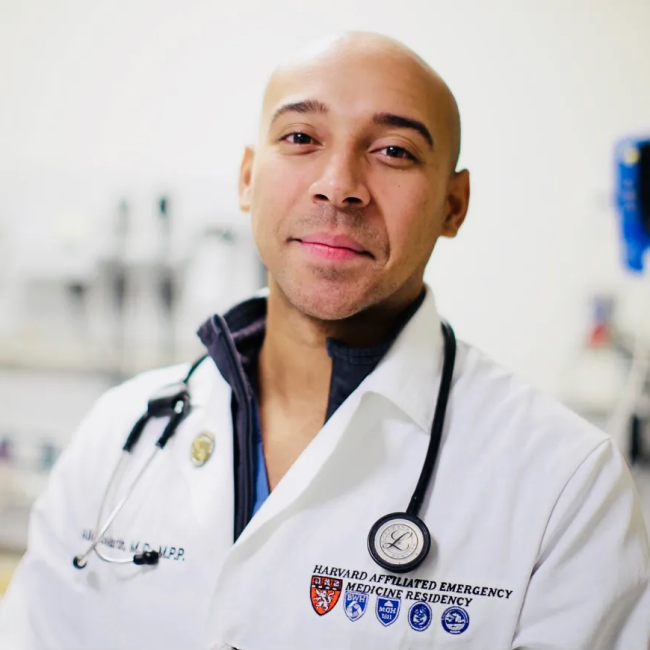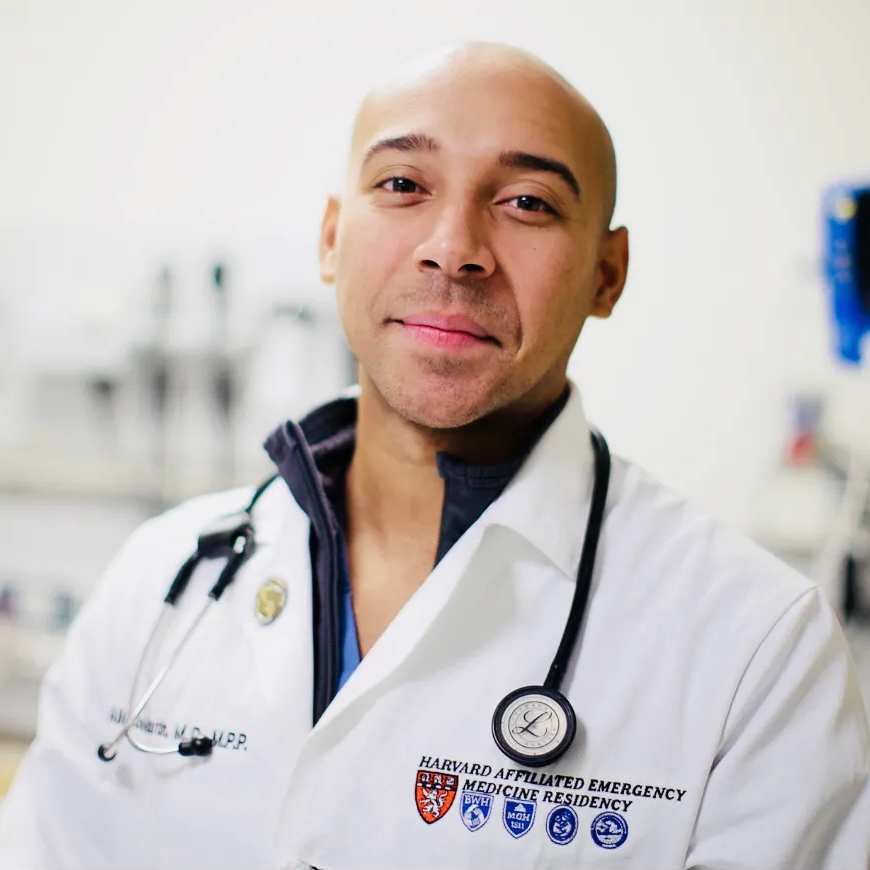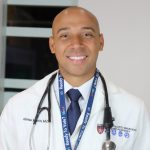Curated conversations with data and AI for social impact leaders on their career journeys
Pathways to Impact is a series of conversations with data for social impact leaders exploring their career journeys. Perry Hewitt, Chief Strategy Officer of data.org, spoke with Dr. Alister Martin, an ER physician and founder of Link Health, an organization that uses technology—including AI—to help low-income patients enroll in United States federal government assistance programs while they wait in healthcare settings.
Can you tell us about yourself and about your work at the intersection of tech and health?
I’m an ER physician and the founder of Link Health, which is focused on helping eligible patients enroll in cash assistance benefit programs. At Link Health, we’ve unlocked a way to have artificial intelligence help do that for thousands of Americans.
If you’ve worked in—or even been in—an emergency department, you understand that our healthcare system is not functioning. You can only do so much work as an emergency physician until you begin to think, “There’s gotta be a better way to do this. There’s a better approach than just jumping in the river and trying to save the drowning person.” Eventually, somebody has to go upstream and figure out why all of these people are drowning in the first place.
My work is really focused on solving this problem; throughout my career, it has taken multiple shapes. For example, it’s been helping people who are in healthcare waiting rooms be able to vote. Through our initiative, Vot-ER, we help people register to vote while they’re waiting to be seen. We believe that through the power of the vote, they can create a healthier and more robust healthcare system.
And that work also includes what we’re doing here with people and technology at Link Health. We’re trying to figure out how to use someone’s time in the waiting room to get them connected to the cash assistance benefit programs that they are already eligible for. The data on who is eligible is all there, but we need to make people aware and get them connected. Through that program, we’re proud to have helped over 3,300 patients enroll in vital federal benefit programs, ranging from rental and cash assistance to contributions toward a child’s 529 college savings account. Altogether, that’s more than $4.4 million in financial support distributed over the past two years. And we’re just getting started.
Our first iteration of Link Health required throwing a lot of humans at the work… but the reality is that we're never going to scale our impact like that.
Dr. Alister Martin Founder and CEO Link Health
Were there any unexpected blockers or pivots in your career journey?
I came to medicine from a low-income community. I had never been on the clinical side of a healthcare setting, so I quite frankly didn’t know what I was getting myself into. By the time I was in my third year at Harvard Medical School (HMS), which is when you do your clinical rotations, I felt very disappointed. I think I would use the word “heartbroken” about the way that the healthcare system works.
There were things that I witnessed as an idealistic 23- and 24-year-old that broke my heart, and many of them had to do with the way that we treated patients who were either low-income or uninsured. So I had a decision to make: do I stay in this field and continue committing the harm, or do I head in a different direction? And that’s when I left HMS for two years.
During that time, I went to the Harvard Kennedy School of Government to learn how government works. I don’t think I actually learned how government works; instead, I found more questions to ask. After that, I worked in politics for the Governor of Vermont, and that was an eye-opening experience in learning how to get things done. And then I came back and did my residency at Massachusetts General Hospital; I was committed to medicine, but to doing it a different way. This career detour improved my work as a physician and a changemaker.
Part of the Pathways to Impact series
You spoke of coming to medicine from a low-income community. How has that been an advantage or a disadvantage in your career?
I think that the great gift of those who live on the margins of society is that they learn how to survive on the margins of society. If you are then put at the center of society, where it’s a resource-rich environment, you can see clearly what those resources can bring.
You learn on the margins that you have to practice survival-based efficiency, where every decision has to be made with the knowledge that you may not get this chance again. So when you move to a place where there are more resources, it’s like Disney World. You learn to spot the opportunities quickly. I think it’s a real advantage.
Were you able to identify the kind of changes and solutions you felt were needed when you returned to medicine?
As a 20-something-year-old in medical school, I definitely didn’t understand what the solutions were. I just knew how bad the problem was. I know that there is a really wide health/wealth gap for Medicaid patients that I see here in Massachusetts. With an average income of $22,000 a year for Medicaid enrollees, how are we expecting these patients to be healthy? People are wrestling with the skyrocketing prices for groceries and with putting gas in their tanks.
I don’t promise to know what the solutions are now–just what some of them could be.
My experience working at the White House taught me that there is some money available: federal and state programs that many low-income patients are eligible for but aren’t accessing. And that planted the idea for Link Health as one possible solution.
We don’t necessarily have to overhaul the whole system–although one could argue that probably some part of that is necessary. But we can optimize what we have today, using new technologies and existing dollars.
Our first iteration of Link Health required throwing a lot of humans at the work. And we still have a workforce: today, we have almost a hundred certified patient navigators whom we’ve trained to go out in those waiting rooms and enroll people in these programs. But the reality is that we’re never not going to scale our impact like that. That’s why the work that we are doing with the AI2AI Challenge award from data.org and the Mastercard Center for Inclusive Growth is so important. If we can leverage artificial intelligence using large language models, we can more effectively blanket clinical spaces with an invitation to check if you are eligible for these programs, and then help you with the process of enrolling. We are learning that a great deal can be done with a very well-written algorithm. With this technology, we don’t need to rely on human intervention alone, but can focus on the places where humans in the loop are critical in aiding patients with their applications.
Your medical degree and your data and AI vision clearly inform your contribution to social impact. Which other skills have offered the greatest return in your work — which abilities have really supercharged your career pathway?
The thing that comes to mind right away is one specific thing I learned during my time at the Kennedy School: the adaptive leadership framework. I have no disclosures here; this framework simply changed my leadership perception and practice. Interestingly, it’s taught by a physician, actually a psychiatrist.
Here’s how I understand it: in medicine, you have all these houses of medicine, these different specialties. There are different ways to be a physician: an ear, nose, and throat doctor; a dermatologist; a rheumatologist, and each of these has their specific practices and ways in which they are a doctor. It took me going to the Kennedy School to realize that leadership is like that, too: there are lots of ways to exercise leadership.
The adaptive leadership framework holds that leadership is not a position: it’s a verb. Leading is an exercise, and in a well-run organization, every person in that organization is empowered to try to do the work of pushing the organization towards solving its real challenges–and not shying away from the reality of the challenges. The framework also taught me how to think politically about coalitions and build partnerships that are mutually beneficial to do the work that the community needs.
If we can leverage artificial intelligence using large language models, we can more effectively blanket clinical spaces with an invitation to check if you are eligible for these programs, and then help you with the process of enrolling.
Dr. Alister Martin Founder and CEO Link Health
What advice do you have for someone who is new to the data and AI for social impact field?
The things that I would share right up front: you have to fall in love with the problem that you’re solving, not the solution that you are creating. You need to deeply understand the contours of the problem and why it exists before you settle on a solution.
For example, when you try to address a problem, you have to make sure you understand the secondary consequences of that solution. Who stands to lose from you addressing or fixing this problem? The system is currently benefiting from the way the problem exists. You need to understand why that is.
It helps to have an understanding of community organizing. That’s the framework that I’m speaking to you from. As a community organizer, you’re not saying this is the solution that we need to move forward with. Instead, it’s more like orchestration. The piece of advice that I would share about tackling a problem is shifting from a mindset of “I have the solution, and I need to persuade people to go with it.”
The second piece of advice that I would share is this: you need to be using artificial intelligence yesterday. If you are not, you will be subsumed. It is an incredibly important resource, and I’ll leave it at that. Concretely, we do this through traditional skilling, but we also have watch parties for an hour every other week. For example, I’ll do a session where I am sharing my screen and showing you how I use ChatGPT’s new operator program, or giving an example of how deep research works. It can be as little as 10 or 15 minutes of an example, but it sparks learning and conversation. And then you can unlock the creativity of the team; people will give you ideas on ways to use this tool to maximize your productivity far and beyond what you could come up with alone. I really like the gelling that happens when we share and compare notes.
What’s your don’t-miss read?
The Politico Pulse daily newsletter is very, very good. It’s into the appropriate amount of detail on healthcare legislation.
About the Author
Chief Strategy Officer Perry Hewitt joined data.org in 2020 with deep experience in both the for-profit and nonprofit sectors. She oversees the global data.org brand and how it connects to partners and funders around the world.
Read moreSeries
Pathways to Impact
This data.org series interviews leaders in Data Science for Social Impact with a lens of how they got there, as well as the skills and experiences that have fueled their career progression.


